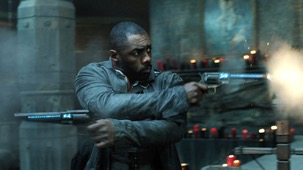The Remington 1858 New Army Revolver. Two of them to be exact. These weapons figure prominently in the film adaptation of Stephen King’s The Dark Tower. It was a good choice aesthetically (if you happen to think guns possess positive aesthetic qualities) as they are both sleek looking and, by all accounts, efficient, reliable tools for killing. They are also a critical aspect of the central thesis of The Dark Tower: the most effective way to combat evil is a well aimed bullet.
If that seems simplistic and uber American, well, this is Stephen King after all. The singular purveyor of a blue collar, Springsteen-soundtracked mythos, King has spit out a world that is inhabited by gunslingers that echo Eastwood’s Pale Rider (who carried the exact same weapons) and Technocrats/Wizards that are more Vegas than Tolkien. In this case the Gunslinger (Idris Elba) is committed to obliterating his nemesis, The Man In Black (Matthew McConaughey). There is a young boy who discovers his vaguely defined psychic powers, and multiple worlds, and all sorts of other surface detail involved, but the real bones of this movie, what makes it at least occasionally interesting, is the dance between the two archetypes.
There certainly is a lot more to the universe that King created over multiple books and several decades. And these details all follow similar themes—the detritus of Americana, both physically and existentially, litter the known universe. The Dark Tower is a kind of Spark Notes for the book series. The film contains enough to hint at the broader themes, but it never fleshes them out sufficiently to be anything other than a kind of visual index.
The Dark Tower is also not a good film, at least in any conventional sense. It is often muddled and suffers from uneven performances. The visuals are sometimes compelling, other times they are sloppy and poorly conceived. It feels rushed at times and seems to have been cobbled together over several different cuts.
And yet...
If you pick at the component parts, much of Stephen King’s fiction just doesn’t seem very interesting. The central ideas are often cliche and/or contrived. The characters verge on parody, and the writing is often florid and overstuffed. However the whole is usually greater than the sum of its parts. This is particularly true of the The Dark Tower series and it is, for me, some of his best work. The Dark Tower as a film shares that aspect of the King DNA. There are real moments in this film: of horror and tension, despair and sadness, even a couple that feel redeeming. Part of that is Idris Elba, who is a presence on screen like few others these days. McConaughey also seems to be enjoying himself.
But it is the central theme, the good versus evil, The Gunslinger facing down The Man In Black that energizes this movie. It is an almost irresistible trope when properly deployed and King, more than any other modern storyteller, understands how to breath life into what seems like tired, worn out material. Part of that is just his enthusiasm for the subject matter—ironically perhaps, there has never been a lot of commercial pandering in King—and part is how ingrained in and fundamental to western literature these kinds of stories are.
Enough of that magic leaked onto this film that it was more fun than not. And Elba’s facility with the tools of his trade, no matter how crude and undiscerning their justice may be in real life, are a thrilling exclamation point when he deploys them. The gun is a totem the wronged pray to and the evil despise. Which can leave you feeling pretty compromised after the fact, but during the moment it makes complete sense. And that, in a lot of ways, sums up almost every piece of work Stephen King produces.
Sincerely,

Tim







